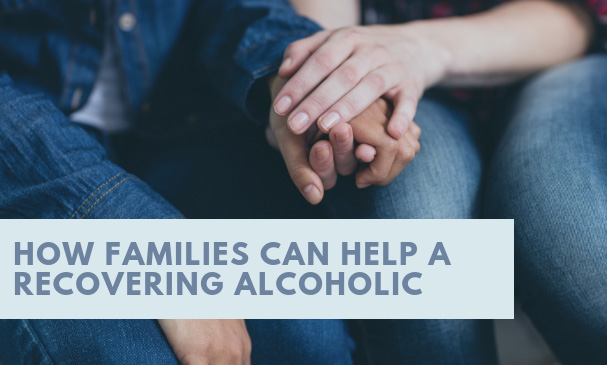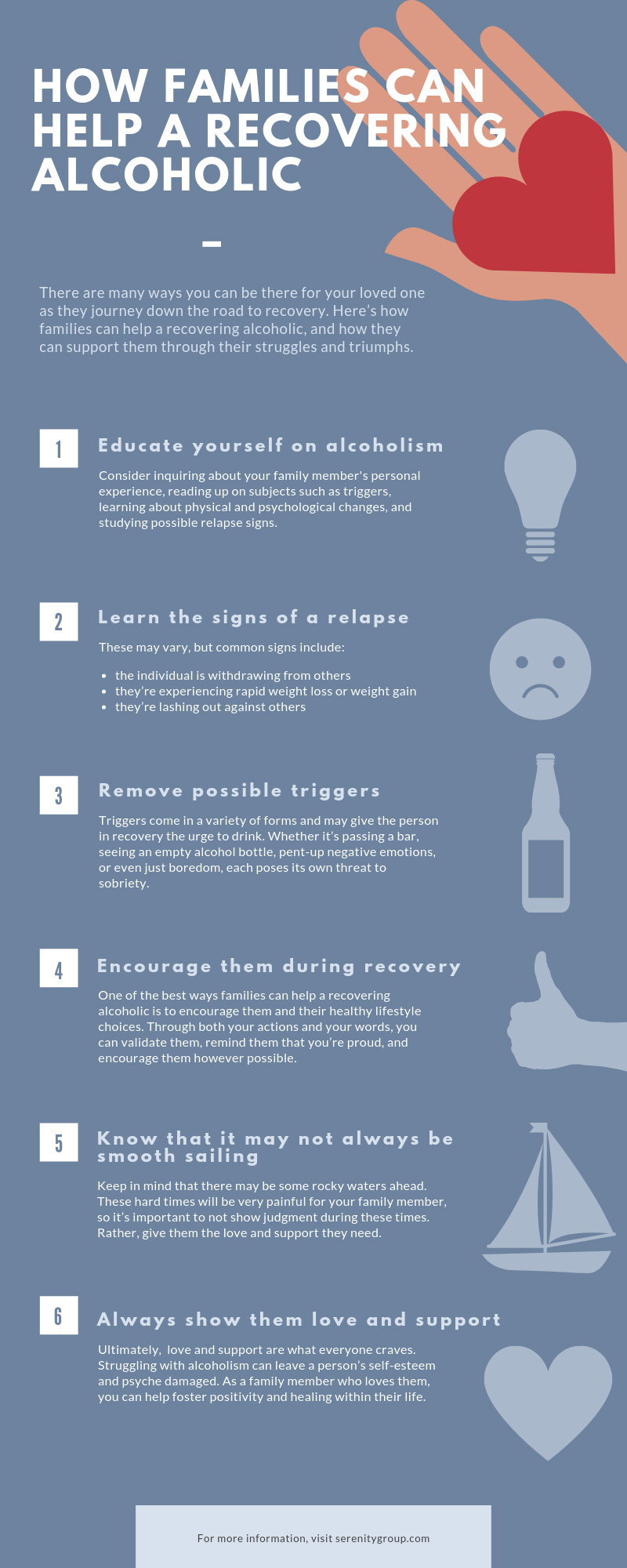How Families Can Help a Recovering Alcoholic

Approximately 300 million people across the globe currently struggle with alcohol use disorder. As such, to say that alcoholism is something that affects nearly everyone would be an understatement. If your family member struggles with alcoholism, you know firsthand just how paralyzing it can feel. Thankfully, there are many ways you can be there for your loved one as they journey down the road to recovery. Here’s how families can help a recovering alcoholic, and how they can support them through their struggles and triumphs.
Educate yourself on alcoholism
While many people may think they know about alcoholism from television or movies, alcohol addiction is much more nuanced. Alcoholism affects everyone differently, and it is important to be aware of this so you aren’t going into conversations or situations blind. Education is a necessary component for supporting your family member. Consider inquiring about their personal experience, reading up on subjects such as triggers, learning about physical and psychological changes, and studying possible relapse signs.
Learn the signs of a relapse
As much as we would like to think recovery is a straight line, many people may experience a relapse. To circumvent this as much as possible, it’s important to educate yourself on the signs of a relapse. These may vary from person to person, but common signs include:
- the individual is withdrawing from others
- they’re experiencing rapid weight loss or weight gain
- they’re lashing out against others
It’s best to have a plan in place and set boundaries early on in case your family member does relapse. To best help them, host regular check-ins where you discuss their emotional and physical state. You can never be too proactive when it comes to recovery from alcoholism.
Remove possible triggers
Recovering alcoholics, no matter how strong they feel, may fall back to their old mindset due to certain triggers. These triggers come in a variety of forms and may give the person in recovery the urge to drink. Whether it’s passing a bar, seeing an empty alcohol bottle, pent-up negative emotions, or even just boredom, each poses its own threat to sobriety. If possible, remove those triggers from your home. Even if you drink on occasion, it’s important to keep that out of sight from your family member who is in recovery.
Encourage them during recovery
The road to recovery is a long and often painful one, so your family member needs all the support they can get. One of the best ways families can help a recovering alcoholicis to encourage them and their healthy lifestyle choices. Through both your actions and your words, you can validate them, remind them that you’re proud, and encourage them however possible. It’s also important to encourage the following healthy activities:
Individual therapy
It may be tempting to act like your family member’s therapist, but that will just end up hurting both of you in the long run. While it’s important to be there for them, when it comes to true recovery, a licensed therapist knows how to facilitate lasting growth. As they try to find a therapist, encourage your family member that, although it may be uncomfortable at first, the support will be well worth it.
Family therapy
If your family really wants to get involved in your loved one’s recovery, family therapy is a great option. Not only will it educate everyone on alcohol addiction, but it will help people air any of their thoughts, grievances, or fears in a safe space. There are a lot of stressors that familial tension can bring out, and those stressors can even trigger a relapse. Nip those in the bud by talking altogether in a productive, healthy manner.
Support groups
For those who have struggled with alcoholism, it’s all too easy to feel isolated and alone. If it seems like your family member is turning inwardly, or lamenting about their past struggles, support groups could be the way to go. They offer a safe space to heal and provide your loved one with a supportive community of individuals who have been in the same shoes. It’s essential that, on the road to recovery, one doesn’t feel alone. A support group can help add that accountability and care.
Know that it may not always be smooth sailing
It is important to note that the road to recovery isn’t linear. There is always the looming threat of relapse, and your loved one will feel that weight every day for quite some time. While it’s important to be hopeful, it’s equally as important to be realistic. Rather than assuming everything will go perfectly, understand that there may be some rocky waters ahead. These hard times will be very painful for your family member, so it’s important to not show judgment during these times. Rather, give them the love and support they need, and nudge them back toward healthy forms of recovery.
Always show them love and support
At the end of the day, through the ups and downs of recovery, love and support are what everyone craves. Struggling with alcoholism can leave a person’s self-esteem and psyche damaged. As such, they may have feelings of guilt, pain, and unworthiness. As a family member who loves them, you can help foster positivity and healing within their life. There are many tools and tips to follow, but at the core, it’s important to remember that kindness can take you a long, long way.
It can often feel like you’re helpless when watching your family member struggle with alcoholism and recovery. However, there are real ways you can help them through the process and back to the life they’ve dreamed of, and obtaining independence is a big part of this. Whether it’s helping them obtain SR22 insurance in Las Vegas, Chicago, or any other city, or encouraging them to go to counseling, each is a step toward a better life. With the right techniques and care, your family member can get the support they need throughout the recovery process.


Recent Comments